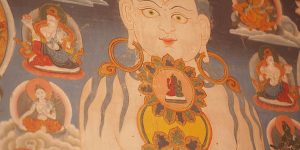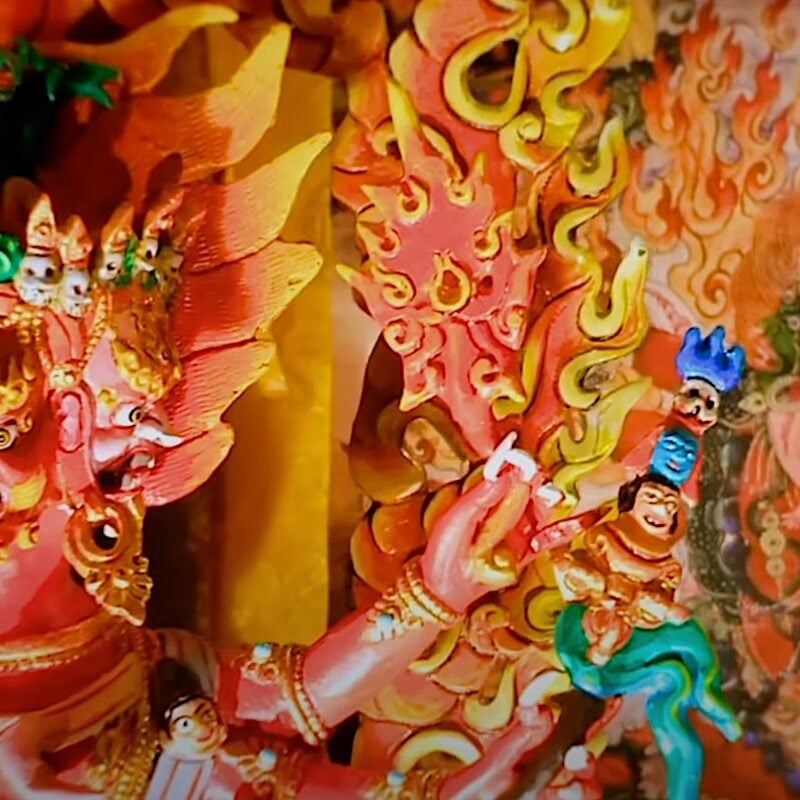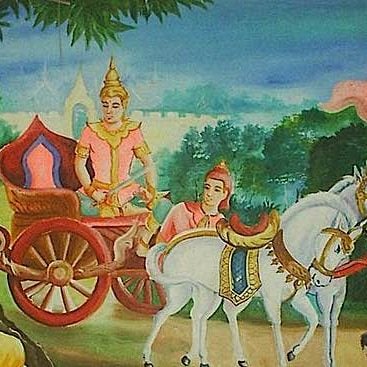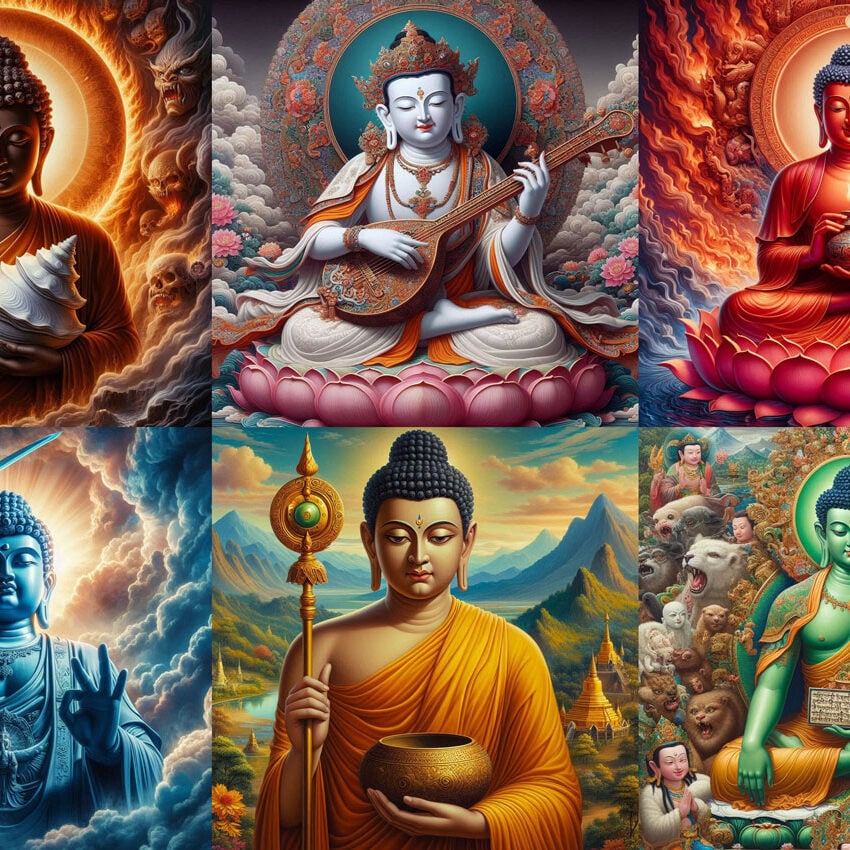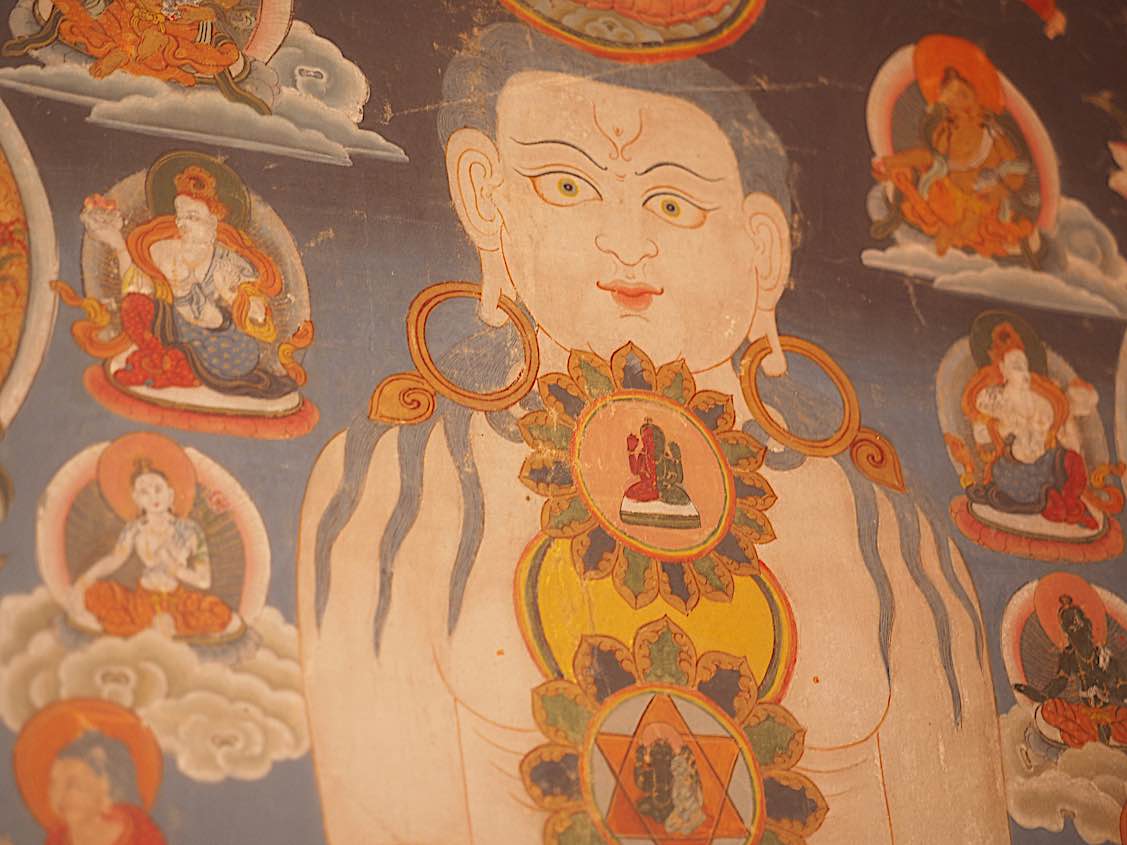Tara’s Great Dharani Supreme of all Mantras –with Music version– and the Sutra of Tara Who Protects from the Eight Fears: in Tara’s Own Words

Tara’s vast popularity in Mahayana Buddhism — as both Bodhisattva and Buddha — is easy to understand. Not only is she a “Mother” — a mother deity and the “Mother of All Buddhas” — but she also protects us from the Eight Dangers or Fears, including diseases and epidemics. The Eight Dangers and fears include all dangers and fears: 8 outer, 8 inner and 8 secret dangers.
How important is Tara? It was at Tara’s urging that the great Atisha left India to go to Tibet and brought the Dharma. It was Tara who challenged great Naropa with the question: “Do you understand the words or the sense?” The Mahsiddha Surya Gupta received teachings on the 21 Taras directly from Tara. The great Enlightened Padmasambhava himself brought Tara practice to Tibet. Countless Mahasiddhis and Yogis in India, Tibet and Nepal relied on Tara.
Sanskrit Chanted Version by Buddha Weekly band:
In other words, her practice is much more than mundane protection from dangers in our daily lives. (Although, to see Tara in action overcoming “attackers” see the beautiful painting below of the monk rescued by Tara from his attackers.)
- NOTE: In this feature, we include the full English-Translated The Sutra of Tara Who Protects from the Eight Fears below along with the Great Dharani of Tara’s Sutra.
- For other features on Tara, please see our special feature section, with many other in-depth feature stories>>
The Sutra of Tara Who Protects from the Eight Fears is important as a Sutra — Tara’s own beautiful, hopeful, evocative and powerful words.
As explained by Martin Wilson in his wonderful book In Praise of Tara:
“Tara’s beautiful sermon concisely presents this basic situation and outlines the levels of Dharma practice that lead out of it. Having made plain the futility of merely reciting mantras while one neglects to follow impeccably the conduct that must go with them, She delivers a Dharani that will help one’s practice if one uses it right.” [1]

The Great Dharani of the Sutra of Tara
This Dharani is the most protective of Dharanis:
OM NAMO ARYA-AVALOKITESVARAYA
BODHISATTVA
MAHASATTVA
MAHA- KARUNIKAYA
TADYATHA OM TARE TUTTARE TURE SARVA-DUSTAN
PRADUSTAN MAMA KRTE
DZAMBHAYA
STAMBHAYA
MOHAYA
BANDHAYA
HUM HUM HUM
PHAT PHAT PHAT SVAHA
MAMA ARYAVALOKABHAYA NARA
BODHISATTVA MAHASATTVANI
ADHISTHANA
ADHISTHITE MAMA SARVA-KARMA-AVARANA- SVAHBAVA
SUDDHE VISUDDHE
SHODHYAYA VISHODHAYA HUM PHAT SVAHA
There are also countless Tantras dedicated to Tara. This sutra is actually found in the Kangyur (which means, “Translation of the Word”) and is incredibly important to Tibetan Buddhists and Buddhists in Nepal and India.

Commentary and Translation
Great Dharani of Noble Tara Who Protects from Eight Dangers from Āryatārāṣṭaghoratāraṇīsūtra
From Noble Sūtra “Tārā Who Protects from the Eight Dangers”
’phags ma sgrol ma ’jigs pa brgyad las skyob pa’i mdo
འཕགས་མ་སྒྲོལ་མ་འཇིགས་པ་བརྒྱད་ལས་སྐྱོབ་པའི་མདོ།
From: Toh 731 Degé Kangyur, vol. 94 (rgyud ’bum, tsha), folios 222.b–224.b
The supreme and perfect Dharani from the Āryatārāṣṭaghoratāraṇīsūtra are the sacred words of Tara Herself. This is the most powerful and protective of the Great Dharanis Tara, as it includes praise, activities and supplications in one great Dharani.
oṁ nama āryāvalokiteśvarāya bodhisattvāya mahāsattvāya mahākāruṇikāya
tadyathā
oṁ tāre tuttāre ture sarvaduṣṭān praduṣṭān mama kṛte jambhaya stambhaya mohaya bandhaya hūṁ hūṁ hūṁ phaṭ phaṭ phaṭ svāhā
nama āryāvalobhayā narā bodhisattvā mahāsattvāni adhiṣṭhānādhiṣṭhite mama sarvakarmāvaraṇa svabhāvaśuddhe viśuddhe śodhaya viśodhaya hūṁ phaṭ svāhā
Commentary on the Dharani.
Opening Praise to Avalokiteshvara
oṁ nama āryāvalokiteśvarāya bodhisattvāya mahāsattvāya mahākāruṇikāya
The opening of the dhāraṇī is a standard homage to Avalokiteśvara. She is transmitting the mantra in the Sutra to Avalokiteshvara to an audience of Bodhisattvas and Sangha. “oṁ! Homage to Noble Avalokiteśvara, the bodhisattva mahāsattva, the great compassionate one!”
tadyathā
Tadyathā means “it is like this,” or “thus it is” indicating that what follows is the actual Dharani.
oṁ tāre tuttāre ture sarvaduṣṭān praduṣṭān mama kṛte jambhaya stambhaya mohaya bandhaya hūṁ hūṁ hūṁ phaṭ phaṭ phaṭ svāhā
Next is a request to Tārā to dispel obstacles as a grand Dharani.It is often used as a stand-alone Dharani. This translates as “oṁ! Deliverer! Savior! Swift One! Crush, suppress, confound, restrain all the wrong and evil beings for me! hūṁ hūṁ hūṁ phaṭ phaṭ phaṭ svāhā!”
nama āryāvalobhayā narā bodhisattvā mahāsattvāni adhiṣṭhānādhiṣṭhite mama sarvakarmāvaraṇa svabhāvaśuddhe viśuddhe śodhaya viśodhaya hūṁ phaṭ svāhā
The final segment of this dhāraṇī is a supplication or request to Tārā to purify all of our obscurations and negativities. This can be translated as: “Homage to you (Tara), empowered with the blessing of Noble Avalokita, the great bodhisattva mahāsattva! Purify, completely purify, cleanse, and completely clean all my karmic obscurations! hūṁ phaṭ svāhā!”

Putting this all together, the translation is:
oṁ! Homage to Noble Avalokiteśvara, the bodhisattva mahāsattva, the great compassionate one! oṁ! Deliverer! Savior! Swift One! Crush, suppress, confound, restrain all the wrong and evil beings for me! hūṁ hūṁ hūṁ phaṭ phaṭ phaṭ svāhā! Homage to you (Tara), empowered with the blessing of Noble Avalokita, the great bodhisattva mahāsattva! Purify, completely purify, cleanse, and completely clean all my karmic obscurations! hūṁ phaṭ svāhā!
For a recitation of the entire Sutra in English, see our video:
8 Fears Times Three
This relates to the commentary teachings:
1. Outer,
2. Inner, and
3. Secret.
Outer Dangers
The outer meaning of the eight fears are real fears experienced which are given in the Sutra by way of examples (for example “lion’s” representing wild animals” and “water” representing all dangers from the environment (flooding, typhoon, drought). The outer relate to the physical person and the fears presented in a physical material world.
Inner Dangers
The inner meaning relates to passions, ego and negative emotional characteristics. (we can say inner demons: for example, anger is considered to manifest as a “demon” or mara). The inner fears and dangers relates to the mental world.
Secret Dangers
The secret meaning has to do the “practice world” or our practices and vows. Our commitments and vows and practices are what allows us to transform the inner and outer fears and obstacles.
These are summarized in the Vajrayana Vows (the vows to the Five Buddha Families) that we take with Empowerments from our teachers.
The danger is, if we forget the precepts, we accumulate negative karma and obstacles. Five of the Eight are stated in the Five Buddha Families Vow, which is part of the Vajrayana or Tantric Vow:
I shall uphold from today onward
The vows arisen from the Buddha Yoga;
The unsurpassed Three Jewels of The Buddha, Dharma and Sangha.
I will always make the four types of gifts Six times each day;
The pleasing commitments of The great supreme Jewel family.
For the pure, great Lotus family,
Arisen from great enlightenment,
I shall uphold each of the holy Dharmas,
Of the outer, the secret and the three vehicles.
For the great, supreme Action family, I shall uphold purely each of Vows I am endowed with,
And make as many offering as I am able.
I shall generate the holy, unsurpassed Bodhichitta,
And for the welfare of all living beings I shall uphold all of my vows without exception.
I shall uphold purely
The vajra, bell and mudra of
The great, supreme Vajra family,
And I shall uphold purely the Master commitment.
In other words, Tara’s practice, helps us uphold these important practice commitments. The remaining three of commitments to our Teacher, to the practices we’ve taken (such as the promise to practice daily), and to the mission of Bodhichitta.
Tara’s Sutra
In this rest of this feature, we include the full English-Translated The Sutra of Tara Who Protects from the Eight Fears. Sutra recitation is a pre-eminent practice in Mahayana Buddhism. What better way to bring Tara’s protective Enlightened energy into your life than to recite her short sutra daily? Or, for those in a rush, the Great Dharani of the Tara Sutra (above.)

The Sutra of Tara — the Root of Her Popularity
The Sūtra of Tārā Who Protects from the Eight Fears (Skt. tārā ṣṭaghoratāraṇī sūtra, Tib. སྒྲོལ་མ་འཇིགས་པ་བརྒྱད་འཇིགས་པ་བརྒྱད་ལས་སྐྱོབ་པའི་མདོ་, drolma jikpa gyé jikpa gyé lé kyobpé do, Wyl. sgrol ma ‘jigs pa brgyad las skyob pa’i mdo) — is the root of Her popularity. Tibetan Buddhists around the world, by the millions, start their day with Tara practice.
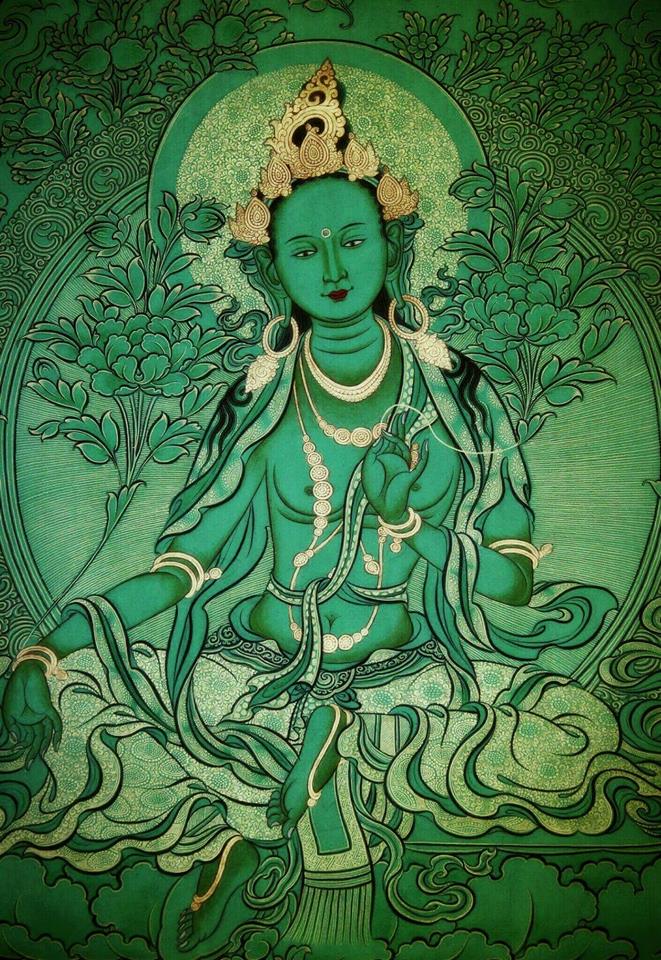
Hers is the first practice and mantra of the day. It’s easy to understand why. As we start a new day in danger-filled Samsara, what is more important than protection from our many fears? Think of it as breakfast with Mom. Nourished with the Dharma, and reassured that the Mother Buddha is on our side, we can get through our hectic day. The other reason Her practice comes first is we honour her by not eating meat. Since most of us cannot be full-time vegetarians, we “cheat” by remaining meat-free until after we meditate with Mother Tara. It’s the least we can do karmically. (And, for those who can stay meat-free, Tara smiles.)
Video: the Complete Story of Arya Tara, Karma Mother of all the Buddhas:
Why fears are so important in Buddhism
Dangers and fears we understand instinctively in our mundane lives — but they are also the causes of our obstacles in our Mahayana Bodhisattva aspiration of Enlightenment for the benefit of all sentient beings. If we can overcome these fears and dangers, we can potentially achieve the goal of realizations.
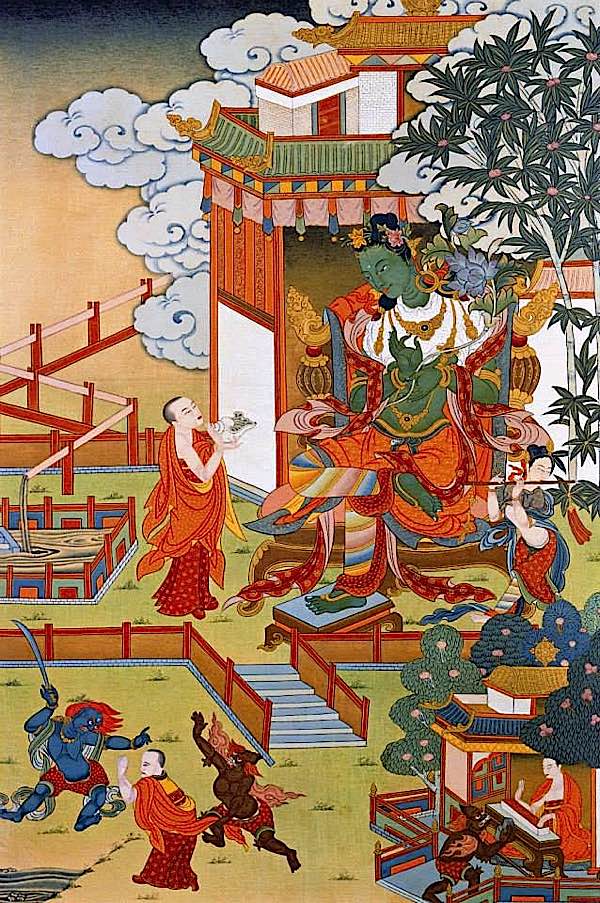
The Eight Fears are the causes of our suffering — and they are also what prevents our realizations. At some level all Buddhist practices — from renunciation through to Lamrim practices and on to Highest Yoga Tantra — all rely on removing our fears and obstacles.
This makes Tara so vital. All Bodhisattvas are compassionate. Tara Herself sprang symbolically from the tears of the World Lord Avalokiteshvara, the Compassionate Bodhisattva. She vowed to help him in his mission to free all suffering sentient beings from Samsara. She is, in fact, an emanation of the Great Lord Chenrezig. She is, as suggested by her green colour, the Activity of all the Buddha’s compassion. What is Her activity? Saving us from the Eight Dangers, the Eight Fears — which are to be understood on two levels: mundane fears and dangers, and the ultimate spiritual fears and dangers.
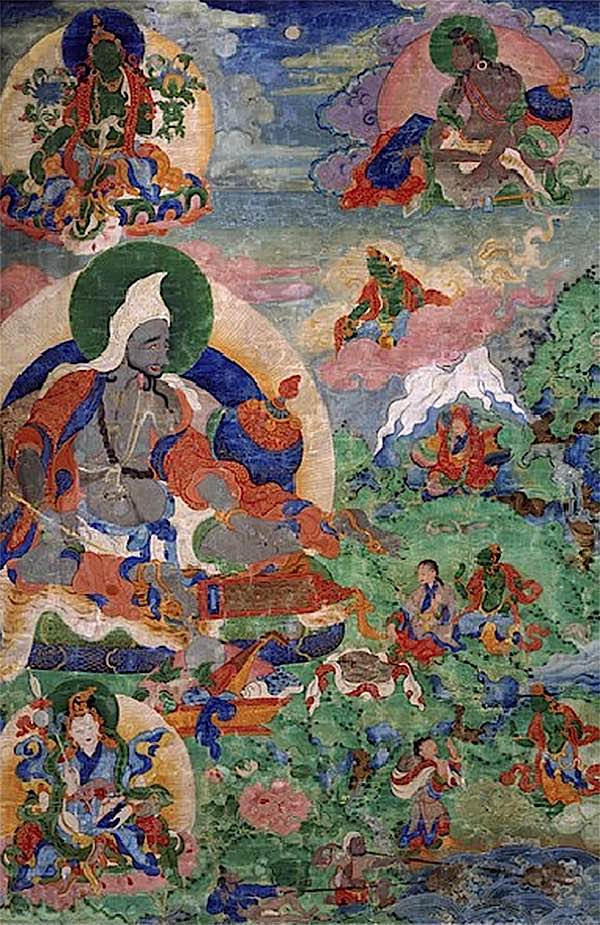
The Eight Fears, including Epidemic Diseases
In the Sutra, verse 26, the eight fears are listed:
“Protector from the eight dangers – lions, elephants and fire, serpents, robbers, water, plagues and demons [pisacas] – homage to You!”
These fears can certainly be taken as literal since protection is vital to our lives — and therefore our practice and our Mahayana mission — but they have a second layer of meanings. Lions can generally mean a wild animal. But it also means “pride.” Our own pride is the cause of many of our obstacles, the root of our ego issues. In commentaries, the eight fears conquered by Tara are aligned with our internal obstacles:
- Lions represent “pride”
- Elephants stand for “ignorance”
- Fire is “anger” — one of the greatest obstacles to Dharma practice
- Serpents are “envy”
- Robbers are “wrong views” — the rob us of the opportunity to attain Enlightenment
- Water (often described as Floods) is “attachment”
- Plagues (disease) — in some Tantras it’s prison, but in the root Sutra it’s Plague or Epidemic — which stands for “avarice.”
- Demons (pisacas) [2] which is aligned with “doubt.”
The translator of the Sutra, Martin Wilson comments:
“The function of Tara from which the Sutra takes its title is mentioned only in verse 26… The only difference from what is now a standard list is ‘plagues’ or epidemic diseases instead of prison.”
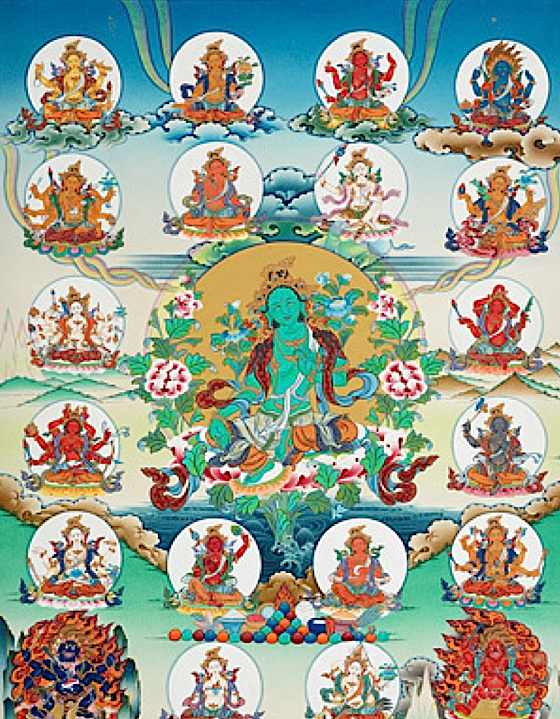
Arya’s own beautiful words
In the sutra Arya-Tara Who Saves from the Eight Fears we hear Her own magnificent words. The sutra records her teachings to a Divine Assembly. The first version cited is the latest translation from the 84000 translation project. The second, (slightly different) translation is from Martin Wilson’s work In Praise of Tara.
84000 project
Toh 731
Degé Kangyur, vol. 94 (rgyud ’bum, tsha), folios 222.b–224.b
First published 2020
Current version v 1.2.11 (2023)
Generated by 84000 Reading Room v2.19.1 [3]
Tārā Who Protects from the Eight Dangers
Praise to the Three Jewels. Praise to the venerable lady Tara. Praise to the Blessed Śākyamuni Buddha.
Thus did I hear at one time. The Blessed One was dwelling in the realm of gods atop Mount Meru. At that time, the goddess Tārā, who was in the assembly, spoke the following words:
Now that you have reached this jewel-like higher realm, you should understand actions and their results. Adhere to the good and abandon the bad, for those who engage in evil actions, will plunge downward when they pass from this world.
Animals, dull and mute, devour one another. They climb and descend, up and down, on an abysmal path of toil. Terrified and afraid, they tremble in panic, as their dreadful suffering defies imagination.
Hungry Ghosts suffer from hunger and thirst, their bodies deformed. If food and drink should appear, it is guarded by others, and even if they consume a little, it turns into fire and swords. Their suffering from hunger and thirst defies imagination.
Those beings who are born in the hell realms are powerlessly led by Yama’s henchmen. Burned and boiled, they are sliced asunder by swords. Their suffering from heat and cold is unbearable.
Thus, those who commit evil deeds in this life, are committing a great injury to themselves. They will be tormented by intense suffering for many eons, with no chance to escape and no means of enduring it.
Keep this clearly in mind, and understand the results of actions. Otherwise you will sow your own unbearable suffering and lament. Even others will be frightened by the terrible din of your agonized screams, for these kinds of sufferings are beyond imagination!
Whoever understands such grave faults will abandon the causes of the three lower realms. Wherever evil manifests, subtle or coarse, act swiftly by way of body, speech, and mind.
You will then be happy and offer help to all beings. You will give up attachment, aversion, and ignorance and strengthen the root of compassion. You will practice virtue, striving avidly with body, speech, and mind, and endeavor in this most profound quintessence.
The fruit of a flower overcome by frost, although cultivated, will produce no sprouts. Likewise, those who transgress their vows and entertain doubts may practice the most profound of vidyā mantras, Thinking, ‘Blessings will come,’ but this is impossible— their efforts amount to meaningless hardship.
Their vidyā mantra becomes like the prattle of common folk, and their absorption resembles the musings of a child. But if people without fault practice vidyā mantras, they shall swiftly accomplish whatever they desire.
Minute though it is, the seed of the banyan tree, well moistened with water and manure in seven months can grow as much as a league. If there can be so much change in outer matter, what need to speak of accomplishing knowledge with knowledge? The inner change of luminosity is beyond all measure.
If one relies on a merchant who knows the way and sets out to sea in an excellent ship, one will find whatever riches are desired, and sail smoothly back to one’s home.
Likewise, if one relies on love, compassion, joy, and equanimity, and practices virtue endowed with the mind of awakening, one will set out on a truly perfect path and be sure to reach the land of wisdom.
When an arrow is released from a person’s fingers, it has certainly been shot, even if one thinks otherwise. Likewise, when a person fully comprehends the meaning of reality, the other shore has been reached, even if one thinks otherwise.
Once the aspects of conduct are naturally perfected, the fruit of Buddhahood will undoubtedly be attained.
When the pristine nature of reality is realized, there is no self, no life force, and also no termination of life force.
There is no action and no ripening of action. The extremes are abandoned, and one is liberated.
In order for you to realize that goal, devotedly recite this quintessence as I proclaim it. If you do, the evil deeds of three incalculable eons will be eradicated,
The three lower realms and all the suffering of saṃsāra will be purified, and the obscurations will be cleared away.
The meaningful quintessence is as follows:
oṁ, bodhisattva great lady, goddess, please protect us!
oṁ nama āryāvalokiteśvarāya bodhisattvāya mahāsattvāya mahākāruṇikāya
tadyathā
oṁ tāre tuttāre ture sarvaduṣṭān praduṣṭān mama kṛte jambhaya stambhaya mohaya bandhaya hūṁ hūṁ hūṁ phaṭ phaṭ phaṭ svāhā
nama āryāvalobhayā narā bodhisattvā mahāsattvāni adhiṣṭhānādhiṣṭhite mama sarvakarmāvaraṇa svabhāvaśuddhe
viśuddhe śodhaya viśodhaya hūṁ phaṭ svāhā
Then the goddess, who is herself the embodiment of buddhahood, is praised:
Lady who acts with immense compassion for the good of beings—
You have all the major and minor marks and are bedecked with precious substances.
Your smile is ravishing, your countenance is joyful, and your eyes are like flax blossoms.
Your ears are like blossoming trumpet flowers.
Your nose is like a lotus bud.
Your mouth is like a mallow in full bloom.
You have a sparkling body and the figure of a young maiden.
Your speech is like a kalavinka bird, proclaiming the Dharma.
Your compassionate mind guards all beings with love. Your left hand holds a lotus, for you are unstained by saṃsāra’s flaws. Your right hand grants protection to all beings to fulfill their aims.
You are seated on the sun and moon of method and wisdom. Venerable lady Tārā, we take refuge in you! Protect us from the great abyss of saṃsāra!
As we circle within the six transmigrations, may you secure us with your noose of great compassion. As we go astray into the three lower realms, may you place us on a path free from straying.
As we are born into families with wrong views, please introduce us to teachers who possess the mind of awakening.
You protect from the eight dangers. The danger of lions, or pride. The danger of elephants, or delusion. The danger of fire, or hatred. The danger of snakes, or jealousy.
The danger of robbers, or wrong views. The danger of prisons, or desire. The danger of floods, or attachments. The danger of demons, or doubts.
We pay homage to you! In this world and in others as well, protect us from these eight dangers!
Until we have reached our goal of Enlightenment, the other shore, may we make the ten perfections our inseparable allies.
The perfection of generosity. The perfection of good moral conduct. The perfection of Patience. The perfection of diligence. The perfection of concentration. The perfection of insight. The perfection of Method. The perfection of aspiration. The perfection of strength. The perfection of wisdom.
Daughters and sons of the Dharma should write down this teaching, read it, recite it, understand it, contemplate it correctly, and explain it extensively to others.
At her words, the whole assembly rejoiced and offered praise.
This completes the Sūtra of “Venerable Tara Who Protects from the Eight Dangers.”
We dedicate the merit of this recitation to the benefit of all sentient beings. May Venerable Tara Protect all beings from the Eight Dangers.

THE SUTRA OF ARYA-TARA WHO SAVES FROM THE EIGHT FEARS
Homage to the Three Jewels! Homage to Venerable Tara! Homage to the Lord Shakyamuni!
Thus have I heard at one time. The lord was residing in the realm of the gods on Mount Meru. Among the assembly there, the Goddess Tara spoke, as follows.
- Having reached this gem-like paradise, Understand actions and their results: Keep to good and leave evil aside!
For whoever practices wrong actions Will, in the life that is to come, fall down. - Beasts are dumb and stupid; one eats another;
Up weary paths, down cliffs, they climb and fall,
In panic, terror-stricken, trembling with fear,
Full of caution – one cannot conceive their sufferings. - Pretas hunger and thirst, and their bodies won’t do. Should food or drink appear, another guards it,
Or if they eat some, it turns to fire or swords.
Their suffering of hunger and thirst can’t be conceived. - Sentient beings who are born in hells
Are led against their will by vicious Yamas,
Burned and cooked and cut up with sharp weapons; Their suffering, hot or cold, cannot be borne. - Therefore, doing wrong deeds in this life Manifests to oneself, magnified –
For many eons, fierce sorrow torments one With no time to escape, nor chance to bear it. - Understand karmic effect by clear recollection. Unbearable suffering and lamentation torment one; Foul speech, fierce body and voice also frighten; These and other sufferings can’t be conceived.
- Those who, knowing thoroughly the faults, Abandon causes of the three realms of woe And in any gross or subtle sin
Never engage with body, speech and mind, - But though happy themselves aid all migrators, Greed, hate, delusion gone, root of compassion
Firm, and striving with the three doors pure do virtue, Strive in this essence of the most profound. - The fruit of a flower that frost has carried off, Though cultivated, will produce no sprout;
So too people who doubt and break their vows, Though they may practice most profound mantras, - Might think a blessing comes, but it cannot – Their pains become but meaningless fatigue, Their mantras like the talk of common folk, Their concentrations but like childish thoughts.
- If people practice those mantras without fault,
Quickly they will accomplish what they wish.
For example, the seed of the banyan tree (nyagrodha) is tiny, But if well moistened with water and manure, - In seven years it grows a league across;
If even external matter has such growth,
What of practicing consciousness with consciousness? Inner clear light’s growth is measureless. - If, relying on traders who know the way,
With a suitable boat one puts to sea,
Then when one has found jewels as one wished, In due course one reaches one’s own home. - With Bodhicitta, relying on Love, Compassion, Joy and Equanimity, practice virtue,
And set out on the Path of true perfection: You will reach the stage of certain knowledge. - If an arrow, shot by a man, has flown,
Indeed it’s been shot, though one may think not. A person who’s realized all Reality’s meaning Goes beyond, although one may think not. - Aspect and nature of actions and parts perfected, Without doubt he’ll gain the fruits of Buddhahood. If one understands that pure Reality (dharmata), There is no self, nor life, nor cutting of life,
- No karma, and no karmic ripening.
That person abandons extremes and is liberated. If to realize that benefit, you recite
Devotedly this essence I’m explaining, - Sins of three countless eons will be consumed,
All sufferings of the three realms of woe and samsara Will be washed away, and obscurations cleared. This beneficial essence is as follows.
OM! Bodhisattva-mahasattva, Goddess! Please will you protect me!
OM NAMO ARYA-AVALOKITESVARAYA / BODHISATTVA / MAHASATTVA / MAHA- KARUNIKAYA / TADYATHA OM TARE TUTTARE TURE SARVA-DUSTAN / PRADUSTAN MAMA KRTE / DZAMBHAYA / STAMBHAYA / MOHAYA / BANDHAYA / HUM HUM HUM / PHAT PHAT PHAT SVAHA / MAMA ARYAVALOKABHAYA NARA / BODHISATTVA MAHASATTVANI / ADHISTHANA / ADHISTHITE MAMA SARVA-KARMA-AVARANA- SVAHBAVA / SUDDHE VISUDDHE / SHODHYAYA VISHODHAYA HUM PHAT SVAHA
- Thereupon, by the Buddha’s power, Full praise was given to the Goddess:
- With very great Compassion
You work the weal of beings, Complete in Marks and Signs, Bedecked with jewel adornments, Your neck most beautiful, And smiling, laughing face!
- Your eye-sense-sphere is like flax-lotuses,
Your ear-sense-sphere like open uk-cho flowers, Your nose-sense-sphere like fragments of utpalas, Your mouth-sense-sphere like full-grown hollyhocks. - Your Body, a lovely maiden’s has various forms;
Your Speech of kalavinka proclaims the Dharma;
Your Mind of compassion is all beings’ loving protector. - Left, a lotus – unstained with samsara’s faults;
Right, giving Refuge, to benefit sentient beings;
You sit on sun and moon seats – Method and Wisdom. Venerable Tara, I go to You for Refuge. - Protect me from samsara’s great abyss, Never to circle in the six migrations!
Hold me with Your cord of Great Compassion, Never to run to the three ill-destiny realms! - Set me on a Path where I cannot stray, Never to be born with perverse views! Let me meet a Guru with Bodhicitta, Never meeting with evil companions!
- Protector from the eight dangers – Lions, elephants and fire,
Serpents, robbers, water, plagues and demons (pisacas)[2] – homage to You! In this life and in others, From the eight fears please protect me!
- Until I win the transcendent Result,
Let me keep inseparable company with
The ten Paramitas of Giving, Morality,
Patience, Energy, Dhyana, Wisdom, Means,
Vow and Power and likewise Wisdom – knowledge!
Any son or daughter of good family should write this teaching, read it, recite it, preserve it, practice right attention upon it, and extensively teach it to others.
Thus spoke [the Lord], and the whole assembly, enraptured, exalted [His word]. This completes the Sutra of Arya –Tara Who Saves from the Eight Fears.
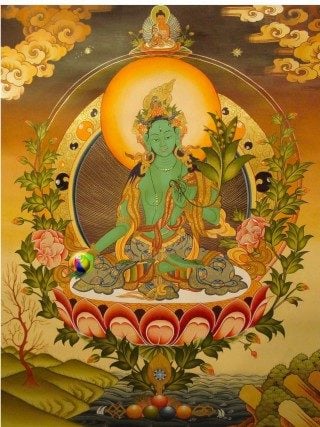
NOTES
[1] The Sutra of Arya-Tara found in Tibetan translation in the Kangyur. The Sutra of Arya-Tara Who Saves From the Eight Fears, translated by Martin Willson, in In Praise of Tara: Songs to the Saviouress, published by Wisdom Publications, 1986, page 87-91
[2] Pishachas are flesh-eating demons in Hindu theology. Such theology describes them as the sons of either Krodha or as Dakṣa’s daughter Piśāca. They have been described to bulging veins and protruding, red eyes. They are believed to have their own languages, known as Paiśāci.
[3] Sutra of Ayra Tara Who Saves from Eight Fears, translated by 84000: Translating the Words of the Buddha is a global non-profit initiative to translate all the Buddha’s words into modern languages, and to make them available to everyone.
More articles by this author

VIDEO: Vajrapani Vajra Armor Mantra: Supreme Protection of Dorje Godrab Vajrakavaca from Padmasambhava
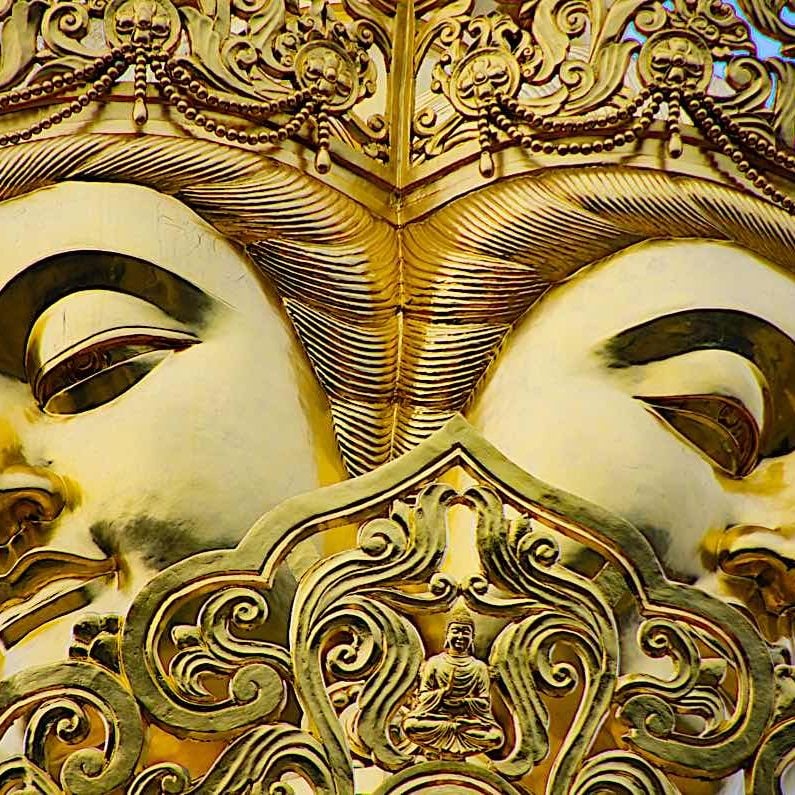
Samantabhadra’s The King of Prayers is the ultimate Buddhist practice how-to and itself a complete practice
Search
Latest Features
Please support the "Spread the Dharma" mission as one of our heroic Dharma Supporting Members, or with a one-time donation.
Please Help Support the “Spread the Dharma” Mission!

Be a part of the noble mission as a supporting member or a patron, or a volunteer contributor of content.
The power of Dharma to help sentient beings, in part, lies in ensuring access to Buddha’s precious Dharma — the mission of Buddha Weekly. We can’t do it without you!
A non-profit association since 2007, Buddha Weekly published many feature articles, videos, and, podcasts. Please consider supporting the mission to preserve and “Spread the Dharma." Your support as either a patron or a supporting member helps defray the high costs of producing quality Dharma content. Thank you! Learn more here, or become one of our super karma heroes on Patreon.
Lee Kane
Author | Buddha Weekly
Lee Kane is the editor of Buddha Weekly, since 2007. His main focuses as a writer are mindfulness techniques, meditation, Dharma and Sutra commentaries, Buddhist practices, international perspectives and traditions, Vajrayana, Mahayana, Zen. He also covers various events.
Lee also contributes as a writer to various other online magazines and blogs.






